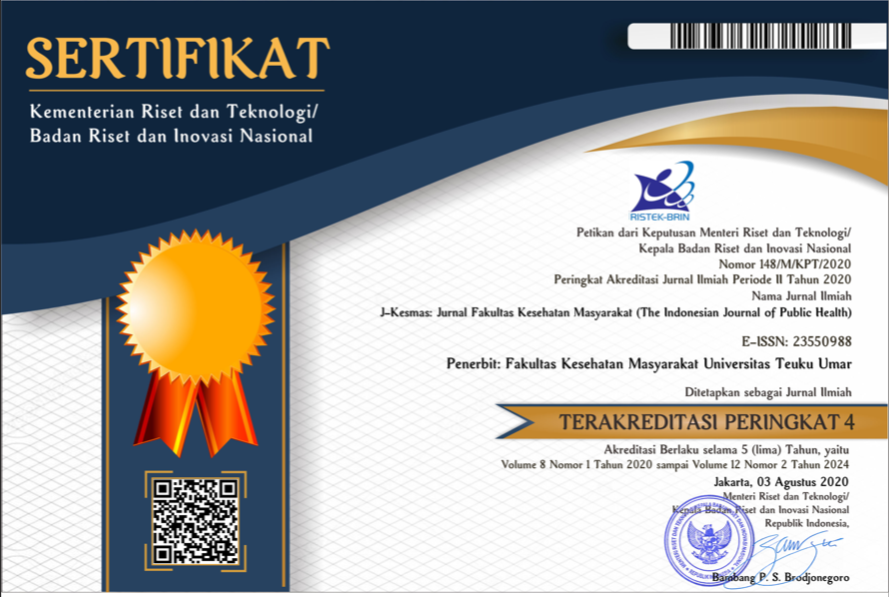Effectiveness of Health Promotion Strategies on Malaria Preventive Behaviors in Woyla Public Health Centers (Puskesmas)
Abstract
Malaria is an infectious disease caused by intracellular obligate protozoa of the genus Plasmodium. The disease is naturally transmitted through the bite of a female Anopheles mosquito. West Aceh Regency Is a district with a high incidence of malaria. West Aceh regency ranks second only to Aceh Jaya in terms of the number of malaria sufferers. West Aceh district is also not included in the 14 districts that have been certified for malaria elimination in Aceh Province in 2016. The purpose of this study is to evaluate the effectiveness of health promotion strategies against changes in people's behaviour in preventing malaria in the East Woyla Subdistrict. This type of research is an experimental study with participatory action research (PAR) design, which is a process where researchers and participants systematically dig and solve problems. The population in this study were all community leaders, health workers, health cadres, and the entire community in East Woyla Subdistrict. A sample of 44 people. The sampling method in this study uses a random sampling quota method. Samples will represent each village in East Woyla Sub-district according to the proportion of the population in each village. The results showed that the Health Promotion strategy effectively changed people's behaviour in malaria prevention efforts. The statistical test results showed the value of Z-score = 5,781 (Z-score > 1.96), and p-value = 0.000 (p<0.05). So it can be decided that the community's health promotion strategy is effective against malaria prevention behaviour. It is recommended that the East Woyla Health Center implement a comprehensive and continuous health promotion strategy for the common goal of achieving malaria elimination in its working area of public health.
Keywords
Full Text:
PDFReferences
Arsin, AA. (2012). Malaria in Indonesia Reviews Epidemiological Aspects. Makasar: Masagena Press
Ministry of Health RI. (2012). Basic Health Research 2011. Jakarta
Ministry of Health RI. 2011 Malaria Epidemiology in Indonesia. Directorate General of PP and PL. Jakarta.
Notoatmodjo, S. (2012). Health Promotion and Health Behaviour. Jakarta. Rineka Cipta.
Ife, Jim & Tesoriero, Frank. (2008). Community Development: Alternative Community Development in the Era of Globalization, Yogyakarta: Publisher of Student Library
Koch T.& Kralik D. (2012). Participatory action research in health care. British: Blackwell publishing
Wafi, Nur &Muslihatun. (2010). Neonatal Care. Yogyakarta. Fitramayana.
WHO. (2010). Guidelines for the treatment of malaria, Second edition, Geneva
Susana, D. (2010). Dynamics of Malaria Transmission. Jakarta. UI Press.
HarijantoPN,AgungN & Agung AG. (2012).Malaria from molecular to clinical. 2nd edition. Jakarta: ECG
Sorontou Y. (2014). Clinical malaria science. Jakarta: ECG
Mubarok Z. (2010). Evaluation of Community Empowerment Reviewed From Capacity Development Process in Pnpm Mandiri Urban Activities in Sastrodirjan Village, Pekalongan Regency. Thesis. Diponegoro University
Ministry of Health RI. (2009). Training Package Book of Health Cadres and Community Leaders in The Development of Standby Village
Notoatmodjo. 2010. Health Research Methodology, Jakarta. Rineka Cipta
DOI: https://doi.org/10.35308/j-kesmas.v8i2.4061
Refbacks
- There are currently no refbacks.
Managed by Fakultas Kesehatan Masyarakat
Published by Universitas Teuku Umar
Website: http://jurnal.utu.ac.id/jkesmas
Email: jkemas@utu.ac.id 
This work is licensed under a Creative Commons Attribution-ShareAlike 4.0 International License.







.jpg)


